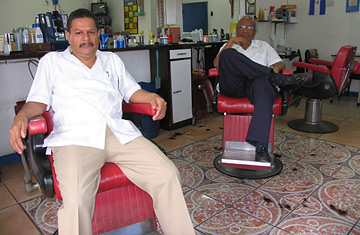
Manuel Rodriguez in his barber shop.
In a country that's nutty about gossip, veteran barbers Cesar Larios and Manuel Rodriguez run the engine room of the national rumor mill — Managua's landmark Imperial Barbershop. Since this modest three-chair barbershop opened its doors 35 years ago, Rodriguez and Larios have seated, aproned and lathered some of Nicaragua's most important politicians, bankers and powerbrokers. Right-wing former president Arnoldo Alemn and ex-communist guerrilla leader Henry "Modesto" Ruiz are both on the client list. His Eminence, Cardinal Miguel Obando y Bravo, the country's top religious authority, has been getting the same haircut here for 30 years. Managua's Sandinista Mayor, Nicho Marenco, comes in for a trim every month, as do the publishers of the two leading opposition dailies, and a flurry of politicians, businessmen and financial leaders.
Once seated comfortably in the red-cushioned barber's chair, even the most powerful member of the elite becomes just another guy in need of grooming. And it's a common-man experience whose relaxed intimacy most of them seem to relish. "They come in and gossip and joke around," says the 61-year-old Rodrguez, as he deftly moves a straight blade around the ears of a lesser-known patron. "The politicians want to know what other people say about them, and what they say about others."
The politicians, of course, also do some politicking of their own.
"The Liberals says bad things about the Sandinistas, and the Sandinistas say bad things about the Liberals — it's a crossfire," says Larios, 56, the barbershop's founder and owner. "When they are sitting in chairs next to each other, they hug and act like friends. But as soon as one of them leaves, the other starts to say bad things again."
The Imperial may simply be the elite's answer to the village barbershop, which has a time-honored role in Nicaraguan society as a place where ideas are exchanged, jokes are tested, names are smeared and rumors are born. All subject matter is open to discussion off the mirror, from politics and sports, to women and weather.
Walking into a Nicaraguan barbershop is a bit like stepping back into the colonial era, and some of the equipment in use is not that much newer. My neighborhood barber gives me a straight-blade shave, proceeded by several rounds of ointments and creams, and then a full facial and head massages with some sort of ancient vibrating contraption that looks like a Thomas Edison prototype. I don't know what that thing is, but it keeps me going back.
And just as the scuttlebutt at the Imperial is a window into Nicaragua's corridors of power, my local barbershop is the best place to take the pulse of the street. Here, news rolls easily off the tongues of those who know what they're talking about, and those who don't. Sometimes, the barbershop itself becomes part of the news: When legendary newspaper publisher and opposition leader Pedro Joaquin Chamorro was gunned down by unknown shooters in January 1978, the leading suspect — one of Larios' clients — told the police he had been getting a haircut at the Imperial Barbershop at the time of the murder. Larios later had to testify that the suspect had not in fact been in his chair that day.
Unless served a summons, however, Larios and Rodriguez prefer to respect barber-client privilege, especially with their bigger clients — the ones who have outgrown the chair, so to speak. Arnoldo Alemn, the portly former president convicted on embezzlement charges, now sends a car and driver to fetch Rodrguez to do a home haircut, for which the barber charges double, or $9. Miguel Obando y Bravo, who used to come into the shop when he was just Archbishop of Managua, started sending the car after the Pope named him cardinal in 1985.
"You build up a confidence with the clients," Rodriguez says, politely declining to discuss any of the really juicy tidbits that have been entrusted to him from the barber's chair over the years. "You hear so much, it's hard to remember everything they say," he adds diplomatically, with a revealing twinkle in his eye. In fact, the reason his clients feel so free to express themselves may be that the whatever they say is carefully swept up with the hair clippings and discarded at the end of the day.
